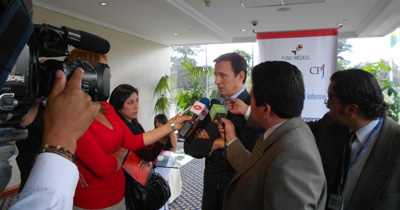The turning point in President Rafael Correa’s aggressive campaign against the private media, Ecuadoran journalists say, came in July with the criminal defamation convictions of four managers of the Guayaquil-based daily El Universo. Bad went to worse when the paper’s former opinion editor and three of its executives were sentenced to jail and fined, along with their newspaper, a total of $40 million over a piece that called the president a “dictator.” Emilio Palacio, who wrote the critical op-ed that infuriated Correa and motivated the lawsuit, fled the country last week after saying that he is being persecuted and justice will not be served.
Concerns about the deterioration of press freedom in Ecuador brought together reporters from television, radio, and print media to cover Thursday’s launch in Quito of CPJ’s special report, “Confrontation, repression in Correa’s Ecuador.” César Ricaurte, executive director of the local press group Fundamedios, which hosted the event at the Hilton, made a brief introduction and presented José Miguel Vivanco, director of Human Rights Watch´s Americas Division, and Diego Cornejo, executive director of the Association of Ecuadoran Editors, who were panelists and made comments on the situation in Ecuador.
HRW’s Vivanco talked about the broad legal framework for free expression in the hemisphere, emphasizing that laws that penalize offensive expressions directed at public officials restrict the rights of freedom of expression and access to information. Vivanco called the El Universo ruling a legal absurdity that threatens freedom of expression in Ecuador. Cornejo said freedom of expression guarantees have weakened since Correa took office in 2007, and said that the government has made systematic attacks against the press a state policy.
CPJ’s report received widespread coverage in local media. On today’s cover, El Universo‘s headline said, “Committee that protects journalists concerned about Ecuador,” while the Quito-based El Comercio opened its political section with the head, “Ecuador is one of the most restrictive countries for the press.” The daily Hoy published an interview with me on page 2, while the daily Expreso made CPJ’s recommendations the highlight of its story on the report. Ecuavisa, Teleamazonas, and Canal Uno, and RTS sent crews to cover the launch as did a number of radio stations.
State media was absent. In fact, on the day CPJ released its report, a union of state media representative held an alternative event. The Latin American Union of News Agencies gathered representatives of state news agencies in Venezuela, Argentina, Cuba, Paraguay, Bolivia, Mexico, Brazil, and Ecuador to discuss the perceived need for government regulation of the private press, according to the state-owned daily El Telégrafo. Journalists noted the timing was no coincidence.
On Wednesday, I took part in a panel organized by the Journalists’ Forum, which debates professional issues. Carlos Jijón, director of the news site La República and former news director of Teleamazonas; Mónica Almedia, news editor for El Universo; Paúl Mena Erazo with the forum; and Fundamedios’ Ricaurte talked about press conditions under Correa. Filming the entire event was a cameraman for state media who didn’t identify himself. Such filming has become a regular practice, according to Ecuadoran journalists, who say the footage is occasionally used to accompany presidential addresses discrediting critical journalists.
While the government did not respond directly to CPJ’s report (and did not respond to requests for comment when CPJ was preparing the report), Correa said in a radio interview today that “it is ridiculous to state that there is no freedom of expression in Ecuador,” according to a story by the official news agency Andes. The agency referred to the CPJ report and criticism by HRW. Our report actually concluded that the administration’s practices were threatening the free expression rights of its citizens. And that, unfortunately, is not so ridiculous.
(Reporting from Quito)
